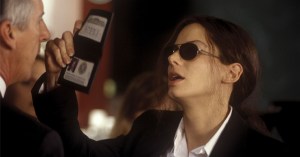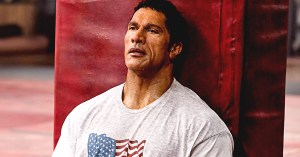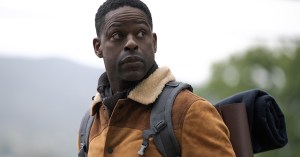Five Favorite Films with Push Director Paul McGuigan
The Scottish filmmaker cites Wong Kar-Wai, Hitchcock, and even Aronofsky.
 Given his filmography of stylized thrillers, Scottish director Paul McGuigan (Gangster No. 1, Wicker Park, Lucky Number Slevin) seemed a fitting choice to helm this month’s supernatural actioner Push, a Hong Kong-set sci-fi adventure about normal people endowed with super powers starring Chris Evans, Dakota Fanning, and Djimon Hounsou. Accordingly, one may be taken aback to hear that McGuigan names romantic auteur Wong Kar-Wai among his favorite directorial influences, but as he demonstrates in Push — which captures the vibrant streets of Hong Kong in lush detail, appropriately — McGuigan possesses a strong visual finesse that belies his history of making brutal crime movies and Hollywood suspense flicks.
Given his filmography of stylized thrillers, Scottish director Paul McGuigan (Gangster No. 1, Wicker Park, Lucky Number Slevin) seemed a fitting choice to helm this month’s supernatural actioner Push, a Hong Kong-set sci-fi adventure about normal people endowed with super powers starring Chris Evans, Dakota Fanning, and Djimon Hounsou. Accordingly, one may be taken aback to hear that McGuigan names romantic auteur Wong Kar-Wai among his favorite directorial influences, but as he demonstrates in Push — which captures the vibrant streets of Hong Kong in lush detail, appropriately — McGuigan possesses a strong visual finesse that belies his history of making brutal crime movies and Hollywood suspense flicks.
McGuigan shared his Five Favorite Films with Rotten Tomatoes, which range from the above mentioned work of Wong Kar-Wai to UK family classics to the edgy work of Darren Aronofsky and beyond. Read on to discover the films most loved by Paul McGuigan, and learn what Hitchockian backstory he’s developing into a feature film.
In the Mood for Love (2001, 88% Tomatometer)
It’s such a beautiful cinematic poem, I suppose. When I did Push in Hong Kong, it was a great pleasure to be able to shoot the film almost in the style of Wong Kar-Wai — just with him in mind, you know. Beautiful light, reds and greens. I actually stayed in one of the apartments in Hong Kong that he designed, which was nice. Lots of wallpaper. As a movie, you’re just so compelled by these two characters, and he only shows glimpses of them, yet they’re so compelling — which is a feat in itself.
Have you taken any cues from Wong Kar-Wai in your overall directorial style?
I’d like to think so. I would never compare myself to Wong Kar-Wai — that would be silly, that would be like comparing yourself to David Beckham. But I would like to make more work that has the kind of silence that he has, you know?
Push isn’t quite that quiet film, is it?
Push is really loud. There’s not much silence in Push. [Laughs] It’s a pretty cool movie; it’s not going to stretch you intellectually, but it’s definitely going to make you have some fun at the cinema. In a way, that’s as much a part of what I do as anything; just to entertain people. It was great for me to do something like this. I mean, imagine going to work and talking about f***ing floating guns, you know?
Chitty Chitty Bang Bang (1968, 59% Tomatometer)
My second favorite film is probably even more intellectually challenging than Wong Kar-Wai; it’s Chitty Chitty Bang Bang. I f***ing love that movie! I have two children; I’ve probably seen this movie, with each child, about 50 times each. And that’s no exaggeration. There’s nothing I don’t know about this movie. I once went to a meeting with an executive in Hollywood, and they asked me what I wanted to do. I said, ‘I’d love to do a remake of Chitty Chitty Bang Bang‘ — I was just making it up — ‘and I’d call it Chitty Chitty Bang Bang Boom,’ and he said that’s a great title! [Laughs] I was only kidding. But that’s a movie I really love.
In the UK at Christmastime, the girls would get The Sound of Music and the boys would get Chitty Chitty Bang Bang. It was that kind of thing, where every Christmas you would see it. So when I had kids, of course I put it on for my son and then he became obsessed with it. It’s the kind of movie where you never really get to the end; it’s so long, and the kids can only really wait so long. But the beginning of the film is like 20 minutes long, before anything even happens. It’s just the story of the car. It’s fantastic!
The Man in the White Suit (1951, 100% Tomatometer)
Alex Guinness, to me is — forget De Niro, forget Pacino — he’s the man. Alec Guinness is such a quintessential English actor, but he’s also a brilliant actor. He’s just the best. And The Man in the White Suit is just such a beautiful, charming movie. It’s about a man who invents a suit that you don’t have to wash. It’s a whole movie about it! It’s something that some of the more flamboyant directors should think about remaking. [Laughs] It’s about this guy who invents this material that keeps white all the time. It’s directed by Alexander Mackendrick, a fellow Scot, and the opening title sequence is amazing. Mackendrick is a brilliant director. I just enjoy his work; I enjoy the pace of his work. I think he’s really overlooked. He did The Ladykillers and Whisky Galore, and The Sweet Smell of Success. A lot of really cool movies.
Alec Guinness, to me — forget Star Wars and all that — he’s just the best. And to work with someone like Alexander Mackendrick, who really understood what a story meant…it’s funny, because on IMDB the movie is listed as sci-fi. It’s not sci-fi, that’s ridiculous! It’s actually a very nice tale, about inventing the thing that nobody wants. Like a car that doesn’t need petrol. The thing that people don’t want because of the money [the auto industry] could make off of you. If you say hey great, I’ve invented this car that doesn’t need petrol, and then there’s a silence, and then there’s a gunshot, and you’re dead. It’s that kind of thing.
Rear Window (1954, 100% Tomatometer)
I love Hitchcock’s Rear Window. I’m actually developing a movie about Robert Capa, who was a war photographer that Hitchcock seemingly based the movie on. I used to take photographs; I was a photographer for many years, and I’m intrigued by this idea. I think it’s a wonderful idea about being a voyeur. He just watches his next door neighbors, and becomes convinced that one of them has been killed. It’s the idea of what you see versus what you really see.
I loved making documentaries for that very reason; you just watch people, even after you’ve shot it. You go back to the edit suite and watch them, and you can understand when they’re telling the truth and when they’re lying. You get to know that stuff. It’s really fascinating — the idea that you can have a movie about something that might have happened… it’s a trick of the eye, or using the camera in a fascinating way. You’re using it to tell a story based on intrigue, and I don’t think I’ve seen that before, or since.
Requiem for a Dream (2000, 78% Tomatometer)
Requiem for a Dream is a really interesting film. It changed my idea of what people really wanted to see. Because I came from the UK, as a European film director, it was interesting to see how American studios or financiers were really into European cinema. They would always quote certain movies that I made that nobody else had seen — like Gangster No. 1. I was amazed, like, ‘Wow, you’ve actually seen that movie?’ And it dawned on me that people in America aren’t that dumb after all, you know? They’re kind of smart — much smarter than I was about movies. And when I saw Requiem for a Dream, I understood it. This guy got cash, he got money, to make this movie. It’s quite a hard movie to actually sell — can you imagine trying to sell that movie? And for that alone I think Aronofsky is a genius. I like what he does. I even liked The Fountain. The Wrestler is a great movie; I think Pi is a genius piece of work. I think he deserves a lot of praise.
For people like me, who come from Europe and go to America and think nobody’s going to know what I’ve done, I’m a struggling filmmaker, and then suddenly you go into a studio and the head exec is like, ‘Gangster No. 1, I loved that film, it had this and that person in it…’ They see everything. I was quite cheered by that.
Push opens in wide release February 6, 2009. Click here for a full synopsis, photo gallery and trailers.
Want more Five Favorite Films? Check out previous installments with Ernest Borgnine, Mickey Rourke, Danny Boyle, and James Franco.






